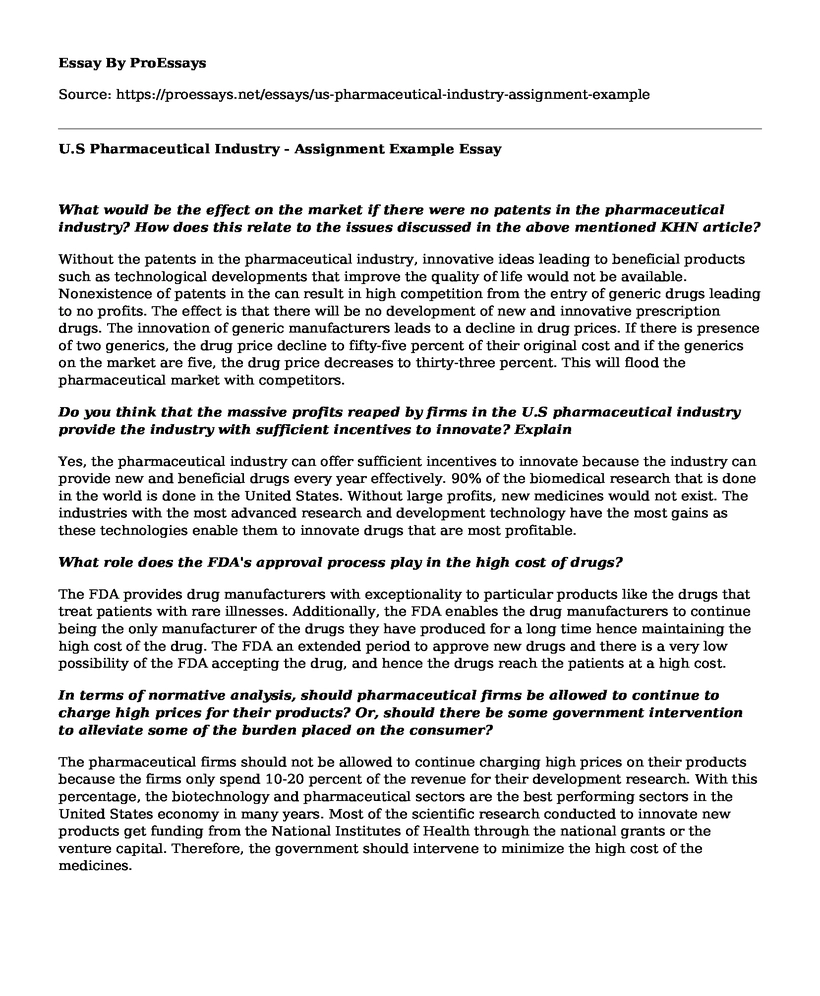What would be the effect on the market if there were no patents in the pharmaceutical industry? How does this relate to the issues discussed in the above mentioned KHN article?
Without the patents in the pharmaceutical industry, innovative ideas leading to beneficial products such as technological developments that improve the quality of life would not be available. Nonexistence of patents in the can result in high competition from the entry of generic drugs leading to no profits. The effect is that there will be no development of new and innovative prescription drugs. The innovation of generic manufacturers leads to a decline in drug prices. If there is presence of two generics, the drug price decline to fifty-five percent of their original cost and if the generics on the market are five, the drug price decreases to thirty-three percent. This will flood the pharmaceutical market with competitors.
Do you think that the massive profits reaped by firms in the U.S pharmaceutical industry provide the industry with sufficient incentives to innovate? Explain
Yes, the pharmaceutical industry can offer sufficient incentives to innovate because the industry can provide new and beneficial drugs every year effectively. 90% of the biomedical research that is done in the world is done in the United States. Without large profits, new medicines would not exist. The industries with the most advanced research and development technology have the most gains as these technologies enable them to innovate drugs that are most profitable.
What role does the FDA's approval process play in the high cost of drugs?
The FDA provides drug manufacturers with exceptionality to particular products like the drugs that treat patients with rare illnesses. Additionally, the FDA enables the drug manufacturers to continue being the only manufacturer of the drugs they have produced for a long time hence maintaining the high cost of the drug. The FDA an extended period to approve new drugs and there is a very low possibility of the FDA accepting the drug, and hence the drugs reach the patients at a high cost.
In terms of normative analysis, should pharmaceutical firms be allowed to continue to charge high prices for their products? Or, should there be some government intervention to alleviate some of the burden placed on the consumer?
The pharmaceutical firms should not be allowed to continue charging high prices on their products because the firms only spend 10-20 percent of the revenue for their development research. With this percentage, the biotechnology and pharmaceutical sectors are the best performing sectors in the United States economy in many years. Most of the scientific research conducted to innovate new products get funding from the National Institutes of Health through the national grants or the venture capital. Therefore, the government should intervene to minimize the high cost of the medicines.
Cite this page
U.S Pharmaceutical Industry - Assignment Example. (2022, Nov 30). Retrieved from https://proessays.net/essays/us-pharmaceutical-industry-assignment-example
If you are the original author of this essay and no longer wish to have it published on the ProEssays website, please click below to request its removal:
- Research Example: Statistical Analysis Whether People's Weight Depends on Their Lifestyle/Diet
- Benefits of Membership in the Nurse Practitioner Alliance of Alabama
- Term Paper Sample: Pathophysiology of Parkinson's Disease
- Paper Example on Health Disparities in the United States
- Effective and Practical Methods of Providing Antimicrobial Therapy Article Review Paper Example
- Research Paper on Diversity-Competence: Enhance Relationships, Knowledge & Skills for Social Workers
- Essay Example on Childhood Obesity in Alabama: A Community Health Assessment







